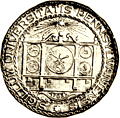
A Medal for Supreme Court Justice Sandra Day O'Connor
 |
The Trustees inaugurated the tradition of presenting the Medal to those who reflect "the highest ideals of the University," and modeled the pewter medal on the silver one worn by Penn Presidents for ceremonial occasions. The silver medal was a gift of the late trustee and alumnus Thomas S. Gates, Jr., (A.B. 1928, LL.D. 1956). One face is engraved with the University seal, the other with the "orrery seal" designed in 1782 by the 1757 alumnus Francis Hopkinson, a signer of the Declaration of Independence.
|
The University of Pennsylvania Medal for Distinguished Achievement was conferred on Supreme Court Justice Sandra Day O'Connor on Friday at the commemoration of the Law School's Sesquicentennial. President Judith Rodin awarded the Penn Medal at the School's gala celebration inside the School's newly restored Silverman Hall. President Rodin co-hosted the event along with Law Dean Michael Fitts. Later that evening, Justice O'Connor delivered the keynote dinner address at the Family Law Symposium 2000: The American Family in the 21st Century. The symposium was jointly sponsored by the Pennsylvania Bar Institute, the Family Law Section of the Philadelphia Bar Association, the Law School, the School of Social Work and the Family Institute of Philadelphia. Penn's Medal has been given on only seven occasions before: the first one went to Attorney General Janet Reno at the October 25, 1993, dedication of the Law School's Nicole E. Tannenbaum Hall; then a week later, to three distinguished chemical engineers--Neal Amundson, Stuart W. Churchill, and Arthur E. Humphrey--to mark the centennial of chemical engineering at Penn; to the American Philosophical Society in celebration of its 250th anniversary in 1994; to the Hon. Walter H. Annenberg and the Hon. Leonore Annenberg at a dinner that year marking the end of the Campaign for Penn; to Vice President Al Gore, Jr., when he came to Penn in 1996 to participate in the 50th anniversary celebration of ENIAC; to three distinguished material scientists--John Christian, John Goodenough and Robert Maddin--to mark the 50th anniversary of materials science and engineering at Penn; and most recently to two mathematicians--Freeman J. Dyson and Cathleen Synge Morawetz--last October as the Mathematics Department celebrated its centennial. | |
The citation accompanying the University of Pennsylvania Medal for Distinguished Achievement conferred on November 17, 2000 to the Hon. Sandra Day O'Connor reads:
Tapped by President Reagan in 1981 to become the first woman Justice of the United States Supreme Court, you brought a fiercely independent spirit to the Bench.
Raised on a ranch in Texas, you learned to rope and ride as a young girl. After graduating from Stanford Law School in record time, you managed a busy professional career while successfully raising three sons.
At the time of your appointment, no other Justice on the Supreme Court could match your breadth of experience: you had been a government lawyer, general practitioner, agency attorney, state legislator and judge at both trial and appellate levels. As majority whip of the Arizona Legislature, you were the first woman to hold this office in any state.
Your trailblazing career has inspired girls and women to believe that they can accomplish anything if they set their minds to it. More than simply a role model, you have set and defended the highest intellectual standards in countless areas of the law. Over two decades of service on the highest court in the land, you have been called a "centrist," a true "common law judge" who approaches each case on its unique facts.
In your jurisprudence, you have been faithful to the letter of the Constitution and the laws, but never afraid to stake out enduring values and common ground. On First Amendment cases, you have fought to preserve the delicate constitutional balance between protected free exercise of religion and prohibited establishment of religion. The doctrinal test that you crafted asks whether a particular law conveys a message of "endorsement" of the religious practice involved. That test has profoundly influenced Constitutional law.
In cases involving privacy rights, you have valued the importance of precedent and continuity, especially in the face of heated controversy. You have defended the fundamental rights of marriage, family, work and parenthood, and your common-sense approach honors the everyday lives of ordinary people.
You have illuminated the respective roles of federal, state and local government and have advocated for preserving the integrity of the boundaries among them.
Through the years, you have maintained a steadfast commitment to friends and family, thus shattering the myth that a woman must choose between a challenging career and a rich personal life.
As you approach your twentieth anniversary on the Court, we join your family, friends and colleagues to celebrate the life and career of a dedicated judge, an exemplary public servant, and a proud grandparent who invites all young girls to dream big dreams.
Almanac, Vol. 47, No. 13, November 21, 2000

